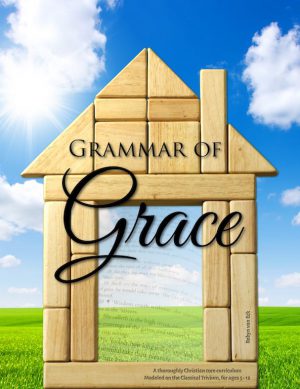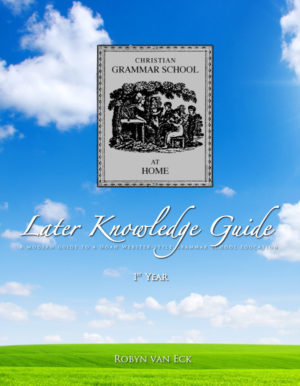Photo by Japheth Mast on Unsplash
What makes a curriculum really Christian? What makes a curriculum really Classical?
If it’s called Christian and Classical, does that make it so?
This is a little bit of the story of how I came to write Grammar of Grace. I had the vision for Christian classical education, so I chose a highly recommended Christian classical homeschool curriculum. But once I dove in, disappointment followed…
(Excerpted from Grammar of Grace.)
In the grammar school years, the children should learn by memorizing, and they ought to memorize the sorts of things that would cultivate their little minds like lush gardens; the texts ought to be life-giving. The children should memorize lots and lots of scriptures, the only thing that is Living and Active, powerful to the salvation of their souls. The scriptures would also teach them vocabulary, grammar, and excellence in language arts. Add to that a timeline of world history and the classical languages, or Latin, at the very least. And they should memorize some of the best examples of the English language in our literature, particularly selections that inspire character and virtue.
This seemed to be the general idea I was getting from the Classical education gurus on the homeschool circuit, so all that remained was to pick a great curriculum and get started.
I went to parent meetings, practicums, and conferences, where the speakers began and ended in prayer, filled their talks with scripture, and sharply warned about the importance of teaching our children a Christian Worldview. When the time came, I selected a curriculum that purported to glorify God, give my children a Classical education, and prepare them with a thorough Christian worldview.
When I began teaching the curriculum, however, things did not turn out as advertized.
The first cloud that appeared, faintly, on the horizon, was a closer look at the timeline my children would memorize. It flatly contradicted the Bible’s history and timeline. At first I was deeply troubled, but I had committed to teach this in our local co-op; and I was assured that I was free to modify the timeline as I wished for my own children at home, given permission to share the problems I saw with the other parents in my class, and encouraged to point out the problematic parts to the higher-ups in the program, so my husband and I decided to stay the course.
As the year was beginning, however, I realized that this curriculum―which was filled with scriptures at every parent meeting I’d been to―did not have any scriptures for the children to study and learn (in English, that is; to be fair, in one year of the curriculum the children learn seven verses in Latin).
A Christian Classical curriculum, with a supposed emphasis on Christian worldview―and there was not a single scripture in the entire curriculum. What, exactly, is the Christian Worldview, if not the Bible?
The next thing that concerned me was that the very young children were to memorize their multiples of 2, 3, 4, 5, all the way to multiples of 15, before they were old enough to understand what they were memorizing. Along with that, there was no poetry or literature, but rather lists of prepositions, helping verbs, and the like for the children to memorize. In a Classical education, the children should memorize beautiful quotations, poetry, and especially scripture. When they are old enough to study formal grammar, they will understand what prepositions are, because they know our language well. Likewise for math, of course, in the study of which problems quickly multiply (wink, wink) when children are taught to perform tasks by rote that they do not understand.
As time went on, I further realized that our expensive curriculum taught history in values-neutral terms, just like the progressive education programs do. The Bible, of course, teaches in no uncertain terms that we must view history in terms of Right and Wrong: Someone either did good in God’s sight, or he did evil in God’s sight. Children, by their nature, will categorize the people and events they’re learning about as Right or Wrong. When we teach them a summary statement like, “The Aztecs built a great civilization,” the children’s assumption, because that sounds like a good thing, is that these were Good people. The truth that many children never learn is that the Aztecs were bloodthirsty pagans, who committed atrocities, as a matter of daily life, to make your hair stand on end. The way God sums up people like that, when He’s writing the history, is with pithy statements like, “They were exceedingly wicked and did great abominations in the sight of the Lord, therefore He slew them.”
I came to realize that this curriculum may have been written by a Christian, but it was not a Christian curriculum. Moreover, it may have been using a Classical approach―emphasizing memorization during the early years, for example, but it was not Classical in the subject matter. It was taking some of the ideas of a Classical education, and using them to “improve” a typical modern educational program, but the foundation was definitely a typical, secular, modern education.
Wow, this was such an odyssey for me, when it was going on. Reading this again, with the benefit on hindsight, it all makes so much sense now; but when I was living through it, there was so much prayer, so many late night conversations with my husband, so much study about what classical education actually consisted of back in the day… What a journey. Praise God for His wonderful works, even in trials!
What’s something God has shown you, through your homeschool journey?
Thanks for dropping by; please keep us in prayer!
Recommended Resources
-

Grammar of Grace
$89.00 – $148.00 Select options This product has multiple variants. The options may be chosen on the product page



Martha
Robyn! You have answered so many questions that have been running through my mind as I have been trying to study the different ‘Christian curriculums’, trying to make a wise decision for my family, but finding that some of them are not saturated with the Word of God- I want my child to walk the path that he was created and assigned to walk by God, I want him to go to an Ivy League school if that’s where he wants to go, or go to the ends of the world with the gospel message- but more than anything, I want him one day to look at the face of Christ and hear the Word “well done good and faithful servant”. I am leaving public school to homeschool because I want his world view to be God-centered and so the curriculum choices I make need to be centered in Him. Thank you for writing a wonderful article and a beautiful curriculum that magnifies God and not the works of man!
Robyn Van Eck
Thank you, Martha!
Jenny
I agree with so many points. Can you help me understand how the CC Timeline is not Biblically accurate? While I don’t find many Biblical events in it, I was curious how you saw it as unscriptural in nature.
Robyn Van Eck
Hi Jenny,
Without addressing any one curriculum in particular, when I’m looking over a history curriculum or Timeline, here are some of the first questions I ask:
– Does it name the date of Creation? (Correct answer: 4004 BC.)
– Does it name the date of the Flood? (Correct answer: 2349-2348 BC.)
– Does it claim that any of the civilizations we know from history, such as Mesopotamia, Sumer, Egypt, Indus River Valley, Minoans, etc., existed before 2348 BC? (Correct answer: They were all founded by Noah’s grandsons or great grandsons, so these civilizations could not have had their founding any earlier than around 2200 BC.)
– Does it claim that the Assyrians had their great empire sometime around 800-700 BC, or does it claim their empire existed 1,000 years before that? (Correct answer: Around 800-700 BC.)
– Does it claim that the Babylonians had their great empire sometime around 600-500 BC, or does it claim their empire existed 1,000 years before that? (Correct answer: Around 600-500 BC.)
These are the first things I’m looking for in any curriculum or history text. They’re dead give-aways, in my book. Secular historians teach us that the earth is 4 billion years old. The Bible plainly gives a date of 4004 BC, if we read it plainly and add the numbers up. "Christian" books that won’t give a date for the Creation don’t believe that part of the Bible is reliable. Same for the Flood. If they give firm dates for children to learn about some things, but not for those, they’re taking a stand against the reliability of the Bible.
Secular historians, discounting the Flood and all of the other history recorded in the Bible, are left to Manetho’s very sketchy dates about the dynasties of Egypt. All of the other ancient civilizations, as dated by secular historians, ultimately rest on Manetho’s dates. That places civilizations like Mesopotamia, Sumer, Egypt, Indus River Valley, Minoans, etc., hundreds of years before the Flood, very neatly (in the secularists’ eyes) proving that the Bible’s history is false. They also date the Assyrians and Babylonians about 1,000 years too early for the same reason. If the secular dates for Babylon and Assyria are accurate, then those civilizations were mere dust, centuries before the Bible says they conquered Israel and Judah. I hope that helps!
Rhonda
I’m looking into Christian home school education for my children. I went to an open house with CC, and something doesn’t feel right about it. Can you recommend some solid curriculum or programs? I’m at the very beginning of our homeschool journey, going to start kindergarten with my first next year. I am a little overwhelmed at all the options and would like to know which ones are Biblically sound. Thank you.
Robyn Van Eck
Hi Rhonda,
Forgive the shameless self-promotion here, but that is exactly why I wrote Grammar of Grace! It’s a wonderful, low-pressure start. Lots of scripture memory, very little written work for young ones, Bible reading, and old-fashioned assignments, modeled on the classical education method. It sounds like very little work (for the young ones, that is… it ramps up around age 10) compared to what a lot of us are used to with the modern methods, but it nurtures and develops their little minds like you wouldn’t believe!!
The heart and soul of Grammar of Grace is two things:
1. The foundation of GOG is the conviction that the Bible is the best thing we can teach our children, for teaching character, wisdom, knowledge, understanding, literature, history… it even touches math and science! If I could teach only one thing to my children, it would be the Bible. With everything else available, more than everything else, I want to teach my children the Bible.
2. Grammar of Grace is patterned on the education methods used by Christians up until about 150 years ago, which we call Classical education, particularly as classical education was put into practice by the Reformers, and even more particularly in the way these methods were applied in post-Reformation America from 1650-1850. I look at Noah Webster, the founding fathers, the Great Awakening, and I pull every tidbit I can about education, and I apply that for myself and other modern mamas as closely as possible.
You can download a sample here. For your little beginning homeschool, I would recommend you grab Grammar of Grace (which is a four-year curriculum), the GOG foreign language audios, and then choose a phonics curriculum that seems good to you. That is all I use for my little ones, and it is amazing how their minds develop and grow following those old methods, and through the input of God’s Word. Take a look through the sample and see if it’s the fit you’re looking for. Please feel free to contact me directly at info@grammarofgrace.com if you have more detailed questions and this seems helpful.